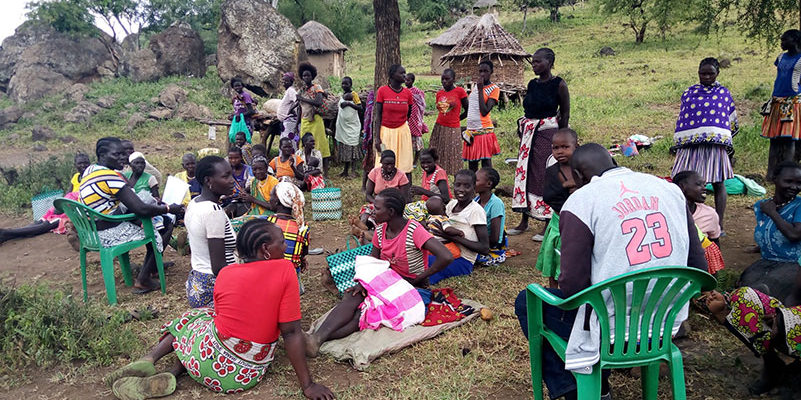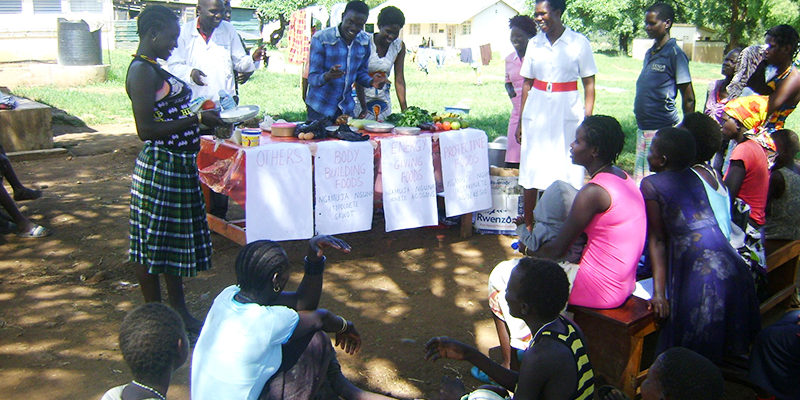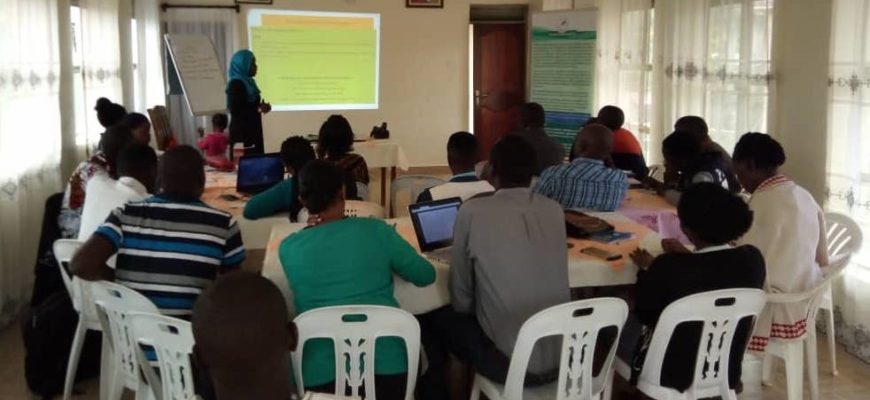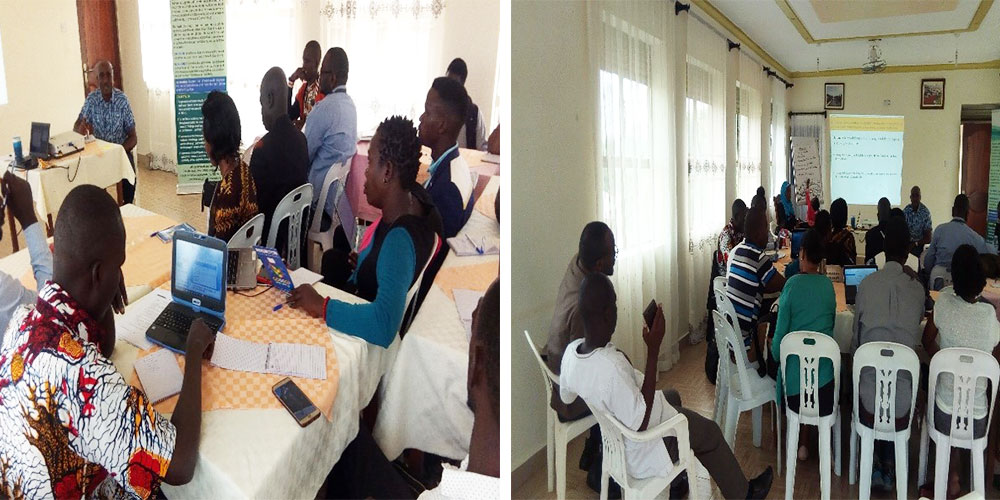Using drama to emphasize hygiene and dietary diversity among communities in Karamoja
Karamoja region registers about 88% illiteracy among its population, with only 12% able to read and write in the districts of Moroto, Kotido, Nakapiripirit, Abim and Kaabong. Based on this information, AfrII and Farm Africa’s Livestock for Livelihoods (L4L) project is using community drama to effectively deliver information on promotion of diet diversity, WASH practices, and discouraging negative cultural norms among the project beneficiaries in Moroto, Napak, Kotido and Nakapiripirit. A drama titled “Diet rights” was successfully shot following the drama script developed in close consultations and guidance from the AfrII L4L nutrition team.
The script was adapted to the local dialect, Ngakarimojong, so as to enable the communities clearly understand the key messages required to effect behavioral change among the women of reproductive age with children less than 5 years in L4L households. The drama emphasizes Water, Sanitation and Hygiene (WASH) as important in prevention of diseases known to affect nutrient utilization among vulnerable groups.
Coincidentally, the drama shooting occurred during the Covid-19 pandemic that has affected lifestyles world over. Therefore, borrowing from and observing the popular message ‘regularly wash your hands’ to control its spread, most of the current L4L project activities are tagged to respond to covid 19, to widely popularize such key messages within the communities reached to ensure their health and safety.
The highly educative drama will be broadcast as a docuseries on AfrII’s YouTube Channel and the website www.afrii.org for wider audiences. The drama / film will also be broadcast on local televisions for further popularity.
Credits: Ngikukus Ug. Ltd, a local film crew that acted the drama, Native Voices International that shot the drama and the L4L project team.
AfrII Trains Lead Mothers, VHTs and Field Agents on Kitchen Gardens for Healthier Nutrition
AfrII nutritionists on the Livestock for Livelihoods (L4L) Project engage in training over 400 Lead Mothers (LMs), Village Health Teams (VHTs) and Field Agents in Kotido, Napak, Moroto and Nakapiripirit districts in the Karamoja sub region on how to set up a kitchen garden using locally available materials. The highly interactive and practical training involves setting up of a demonstration garden in one of the LMs home in order to promote consumption of vegetables at household level. The groups will also be supported with assorted seeds and garden equipment. At least 500 kitchen gardens are expected to be set up after the training.
Selection and verification of 200 Nutrition Inner Circles (NICs) to improve nutrition outcomes at household level

AfrII and Farm Africa’s Livestock for Livelihoods (L4L) project is engaged in field activities to establish 200 active Nutrition Inner Circles (NICs) comprising of between 10-15 Women of reproductive age with children between 0-59 months. The project targets these groups because they are at a higher risk of malnutrition and other infections.
The NICs are being selected from the existing farmer groups in the project areas of Moroto, Nakapiripirit, Napak and Kotido disctricts in the Karamoja region and will be used to contribute to improved nutrition outcomes at household level through promotion of dietary diversity, infant and young child feeding, Water, Sanitation and Hygiene (WASH), implementation of nutrition sensitive and specific interventions among others.
AfrII And Partners Commemorate World Breastfeeding Week

8/08/2019- Uganda, every year joins the rest of the world to commemorate the World Breastfeeding Week during the month of August. This year’s World Breastfeeding Week national celebrations were held on 8th August in Kiboga district under the theme “Empower Parent: Enable Breastfeeding”.
To honor the celebrations, the Africa Innovations Institute (AfrII) together with partners on the Livestock for Livelihoods (L4L) project organized food demonstrations at Moroto regional referral hospital in Karamoja. 50 women of reproductive age and at least 35 children of less that 5 years attended the demonstrations. The activity was highly participatory as the mothers were fully involved in the actual food preparations / cooking of several nutritious dishes including enriched porridge, and a number of balanced foods and “ekitobeero”. Some of the dishes prepared included millet flour + beef + peanut paste + amaranthus /boo, maize flour + silver fish +peanut paste, meat +cassava flour +peanut paste +beans, and fresh cassava tubers + cowpeas +eggs.

Mothers prepare enriched porridge during the food demonstrations at the Moroto regional referral hospital
The demonstrations enabled mothers to acquire the skills and confidence to select food mixtures and prepare improved food recipes using locally available and affordable foods. Also, Mothers and caretakers were able to rehabilitate malnourished children using locally prepared nutritious foods.
Overall, the food demonstrations aimed to; promote consumption of diverse diets, support caretakers of children in OTC/ITC and women of reproductive age to prepare a balanced meal and also prepare a nutritious meal for rehabilitating the malnourished child.
Internationally, World Breastfeeding week is celebrated every year from 1 to 7 August to encourage breastfeeding and improve the health of babies around the world.
AfrII’s Livestock for Livelihoods project introduces the Social Behavioral Change Communication Strategy (SBCC) into their nutrition targeted work

Dr. Muniirah Mbabazi presents the SBCC strategy to stakeholders during the validation workshop in Moroto district.
11/06/2019- The Livestock for Livelihoods (L4L) Social Behavioral Change Communication (SBCC) validation workshop held at Rapona Hotel in Moroto district, attracted a cross-section of stakeholders, partners and government staff implementing nutrition, WASH and livestock projects in the Karamoja sub region.
Presenting the SBCC strategy to participants, the consultant on the L4L project, Dr. Muniirah Mbabazi said that the document is designed to provide direction for implementation of the L4L communication interventions to enhance essential knowledge and skills, and an enabling environment for improved household nutrition, water, sanitation and hygiene practices among women of Reproductive Age (WRA) in the target L4L communities
Additionally, Muniira noted that it will address barriers and enhance the enablers of dietary diversity to reduce under nutrition; specifically, wasting and underweight among the L4L project beneficiaries i.e. children below five years and women of reproductive age.
Over all, the strategy is hinged on interpersonal communication (IPC) as it encourages dialogue, addresses specific barrier and facilitates skills building among peers. In the strategy, the thematic areas for messaging will include improved availability, access and utilization of diverse diets, norm change for better nutrition; income generation among L4L project beneficiaries.
The Livestock for Livelihood (L4L) project is implemented by the Africa Innovations Institute (AfrII) and Farm Africa (FA) in the districts of Napak, Nakapiripiriti, Moroto and Kotido districts in the Karamoja sub region. The project targets 21,000 households (10,500 in each region) to have increased income, reduced malnutrition amongst women and children, and increased access to livestock services.











